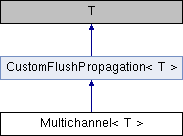Multiple channels support for custom signal processing. More...
 Inheritance diagram for Multichannel< T >:
Inheritance diagram for Multichannel< T >:Public Member Functions | |
| bool | Flush (bool hardFlush, int propagation=-1, bool blocking=true) |
| Flush buffered input and/or output, with signal propagation. More... | |
| bool | MessageSeriesEnd (int propagation=-1, bool blocking=true) |
| Marks the end of a series of messages, with signal propagation. More... | |
| byte * | CreatePutSpace (size_t &size) |
| Request space which can be written into by the caller. More... | |
| size_t | Put2 (const byte *inString, size_t length, int messageEnd, bool blocking) |
| Input multiple bytes for processing. More... | |
| size_t | PutModifiable2 (byte *inString, size_t length, int messageEnd, bool blocking) |
| Input multiple bytes that may be modified by callee. More... | |
| byte * | ChannelCreatePutSpace (const std::string &channel, size_t &size) |
| bool | ChannelPutModifiable (const std::string &channel, byte *inString, size_t length) |
| virtual size_t | ChannelPut2 (const std::string &channel, const byte *begin, size_t length, int messageEnd, bool blocking)=0 |
| size_t | ChannelPutModifiable2 (const std::string &channel, byte *begin, size_t length, int messageEnd, bool blocking) |
| virtual bool | ChannelFlush (const std::string &channel, bool hardFlush, int propagation=-1, bool blocking=true)=0 |
SIGNALS | |
Detailed Description
template<class T>
class Multichannel< T >
Multiple channels support for custom signal processing.
- Template Parameters
-
T the class or type
T should be a BufferedTransformation derived class
Member Function Documentation
◆ Flush()
|
inlinevirtual |
Flush buffered input and/or output, with signal propagation.
- Parameters
-
hardFlush is used to indicate whether all data should be flushed propagation the number of attached transformations the Flush() signal should be passed blocking specifies whether the object should block when processing input
propagation count includes this object. Setting propagation to 1 means this object only. Setting propagation to -1 means unlimited propagation.
- Note
- Hard flushes must be used with care. It means try to process and output everything, even if there may not be enough data to complete the action. For example, hard flushing a HexDecoder would cause an error if you do it after inputing an odd number of hex encoded characters.
- For some types of filters, like ZlibDecompressor, hard flushes can only be done at "synchronization points". These synchronization points are positions in the data stream that are created by hard flushes on the corresponding reverse filters, in this example ZlibCompressor. This is useful when zlib compressed data is moved across a network in packets and compression state is preserved across packets, as in the SSH2 protocol.
Implements CustomFlushPropagation< T >.
◆ MessageSeriesEnd()
|
inline |
Marks the end of a series of messages, with signal propagation.
- Parameters
-
propagation the number of attached transformations the MessageSeriesEnd() signal should be passed blocking specifies whether the object should block when processing input
Each object that receives the signal will perform its processing, decrement propagation, and then pass the signal on to attached transformations if the value is not 0.
propagation count includes this object. Setting propagation to 1 means this object only. Setting propagation to -1 means unlimited propagation.
- Note
- There should be a MessageEnd() immediately before MessageSeriesEnd().
◆ CreatePutSpace()
|
inline |
Request space which can be written into by the caller.
- Parameters
-
size the requested size of the buffer
The purpose of this method is to help avoid extra memory allocations.
size is an IN and OUT parameter and used as a hint. When the call is made, size is the requested size of the buffer. When the call returns, size is the size of the array returned to the caller.
The base class implementation sets size to 0 and returns NULL.
◆ Put2()
|
inline |
Input multiple bytes for processing.
- Parameters
-
inString the byte buffer to process length the size of the string, in bytes messageEnd means how many filters to signal MessageEnd() to, including this one blocking specifies whether the object should block when processing input
Derived classes must implement Put2().
◆ PutModifiable2()
|
inline |
Input multiple bytes that may be modified by callee.
- Parameters
-
inString the byte buffer to process. length the size of the string, in bytes. messageEnd means how many filters to signal MessageEnd() to, including this one. blocking specifies whether the object should block when processing input.
Internally, PutModifiable2() calls Put2().
The documentation for this class was generated from the following file:

 1.8.14
1.8.14